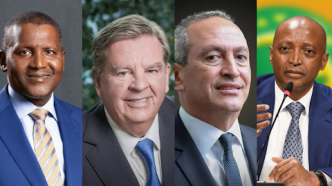Africa’s wealthiest individuals continue to shape the continent’s economic landscape through their vast business empires spanning manufacturing, mining, telecommunications, and luxury goods. According to the latest Forbes Africa Billionaires List, these titans of industry have amassed fortunes that reflect both their entrepreneurial vision and the continent’s economic potential.
Here’s an in-depth look at Africa’s top 10 richest men and the empires they’ve built.
1. Aliko Dangote – $23.9 Billion (Nigeria)
For the 14th consecutive year, Nigerian industrialist Aliko Dangote maintains his position as Africa’s richest person with a net worth of $23.9 billion. His wealth surge is primarily attributed to the successful launch of his long-awaited Dangote Refinery.
Industry: Manufacturing
Source of Wealth: Cement, Sugar, Flour, Oil Refining
Key Assets:
- Dangote Cement (Africa’s largest cement producer with operations in 10 countries and a total production capacity of over 52.0 million tonnes per annum)
- Dangote Refinery (650,000 barrels per day capacity)
- Dangote Fertiliser Plant (Africa’s largest granulated urea fertilizer complex, located within the Lekki Free Trade Zone in Lagos, Nigeria, spans 500 hectares and was constructed at a cost of $2.5 billion).
- Dangote Sugar (It is the largest sugar refinery in sub-Saharan Africa, with a production capacity of 1.44 million metric tons per annum, and is part of the Federal Government of Nigeria’s National Sugar Development Master Plan)
The 650,000 barrels-per-day Dangote Refinery, located outside Lagos, represents one of Africa’s most ambitious infrastructure projects. When operating at full capacity, it’s expected to transform Nigeria from a fuel importer to a potential exporter, fundamentally reshaping West Africa’s petroleum industry.
2. Johann Rupert & Family – $14 Billion (South Africa)
South African luxury goods magnate Johann Rupert ranks second with a fortune valued at $14 billion. The 75-year-old businessman chairs Compagnie Financiere Richemont, one of the world’s leading luxury goods companies. He is the founder and current chairman of the Swiss-based luxury goods group.
Industry: Fashion & Retail
Source of Wealth: Luxury Goods
Key Holdings:
- Compagnie Financiere Richemont (Cartier, Van Cleef & Arpels, Montblanc, Jaeger-LeCoultre)
- Remgro (An investment holding company with diversified interests spanning banking, financial services, packaging, glass manufacturing, healthcare, mining, petroleum, beverages, food, and personal care products. The company is publicly listed on the Johannesburg Stock Exchange.)
Rupert’s luxury empire caters to the world’s wealthy elite, with Cartier alone generating billions in annual revenue. His wealth demonstrates the global reach of South African business leadership and the enduring appeal of high-end luxury goods.
3. Nicky Oppenheimer & Family – $10.4 Billion (South Africa)
The Oppenheimer family fortune, built on diamonds, now stands at $10.4 billion. Nicky Oppenheimer, 80, represents the third generation of a family synonymous with the diamond industry.
Industry: Metals & Mining
Source of Wealth: Diamonds
Legacy:
- Family controlled De Beers diamond mining company for 85 years
- Sold 40% stake in De Beers to Anglo American for $5.1 billion in 2012
- Current investments include Tswalu Kalahari Reserve (The largest privately protected conservation area in South Africa, spanning 118,000 hectares (292,000 acres)), and Fireblade Aviation (A world-class private aviation company).
The Oppenheimer name remains legendary in mining circles. While no longer actively running De Beers, the family’s diversified investments ensure their continued prominence in African business.
4. Nassef Sawiris – $9.6 Billion (Egypt)
Egyptian billionaire Nassef Sawiris ranks fourth with a net worth of $9.6 billion. At 64, he’s built a global empire through strategic investments and operational excellence.
Industry: Construction & Engineering
Source of Wealth: Construction, Chemicals, Fertilizers
Key Holdings:
- Orascom Construction Industries – OCI N.V. (Recognized as Egypt’s first multinational corporation, the company operates in more than 25 countries worldwide)
- Significant stake in Adidas
- LafargeHolcim shares
- Stake in Premier League’s Aston Villa Football Club ( He is the co-owner of Aston Villa Football Club, holding a majority stake through his company V Sports alongside partner Wes Edens).
Sawiris represents Egypt’s new generation of globally minded billionaires, with investments spanning continents and industries from chemicals to sports.
5. Mike Adenuga – $6.8 Billion (Nigeria)
At 72, Mike Adenuga is Nigeria’s second richest person, having built his fortune through telecommunications and oil production.
Industry: Diversified
Source of Wealth: Telecommunications, Oil & Gas, Banking
Business Empire:
- Globacom (Nigeria’s second-largest mobile network with over 60 million subscribers)
- Conoil Producing (oil exploration and production)
- Equitorial Trust Bank (Equitorial Trust Bank was originally owned by Nigerian billionaire Mike Adenuga Jr.. After merging with Devcom Merchant Bank which – he also owned – in 2005 to form ETB, the bank was acquired by Sterling Bank in 2011)
Adenuga’s Globacom operates across Nigeria, Ghana, Benin, and Côte d’Ivoire, making him a major player in West African telecommunications. His oil interests add another dimension to his diversified portfolio.
6. Abdulsamad Rabiu – $5.1 Billion (Nigeria)
Abdulsamad Rabiu, 64, completes Nigeria’s trio of top billionaires with a net worth of $5.1 billion.
Industry: Diversified
Source of Wealth: Cement, Sugar, Real Estate
Key Holdings:
- BUA Cement (Nigeria’s second-largest cement producer – formed by the 2020 merger of Obu Cement Company and Cement Company of Northern Nigeria)
- BUA Foods (sugar refining and other food products)
- BUA Group (One of Nigeria’s largest privately-held diversified conglomerates, with its headquarters in Lagos.)
Rabiu’s BUA Cement directly competes with Dangote Cement, showcasing Nigeria’s competitive cement industry. His expansion into food processing and real estate demonstrates strategic diversification.
7. Naguib Sawiris – $5 Billion (Egypt)
Naguib Sawiris, older brother to Nassef, has built his own telecommunications and media empire worth $5 billion.
Industry: Telecom
Source of Wealth: Telecommunications, Media, Technology
Career Highlights:
- Founded Orascom Telecom Holding
- Sold mobile operations to VimpelCom (now Veon) and Wind Telecom
- Currently focuses on media and technology investments through Orascom TMT Investments
At 71, Naguib pioneered mobile telecommunications across Africa and the Middle East before pivoting to media and technology ventures.
8. Koos Bekker – $3.4 Billion (South Africa) [Tie]
Media mogul Koos Bekker transformed Naspers into a global technology investment powerhouse, building a personal fortune of $3.4 billion in the process.
Industry: Media & Entertainment
Source of Wealth: Media, Technology Investments
Key Achievement:
- Led Naspers’ early investment in Chinese tech giant Tencent (Naspers purchased a 46.5% stake in Tencent for $32 million in May 2001, a decision that became one of the most successful investments in history).
- That single investment, made in 2001 for $34 million, became worth tens of billions
- Built Naspers/Prosus into a global internet and entertainment conglomerate
The 72-year-old’s prescient bet on Tencent is considered one of the greatest venture capital investments in history.
8. Mohamed Mansour – $3.4 Billion (Egypt) [Tie]
Mohamed Mansour shares the 8th position with a net worth of $3.4 billion, earned through a diversified business empire.
Industry: Diversified
Source of Wealth: Automotive Distribution, Heavy Equipment, Real Estate
Mansour Group Holdings:
- Exclusive distributor of General Motors vehicles across Africa
- Caterpillar equipment distributor in Egypt and several African countries
- Significant real estate and private equity investments
- Former Egyptian Minister of Transportation (2006-2009)
At 77, Mansour represents one of Egypt’s most established business families, with operations spanning the Middle East and Africa.
10. Patrice Motsepe – $3 Billion (South Africa)
Mining magnate Patrice Motsepe rounds out the top 10 with a fortune of $3 billion. He’s also the President of the Confederation of African Football (CAF).
Industry: Metals & Mining
Source of Wealth: Mining
Key Holdings:
- African Rainbow Minerals (gold, platinum, nickel, copper, coal). While it does not directly mine gold, it holds an investment in the gold sector through its shareholding in Harmony Gold.
- Stakes in Sanlam and other investments
- Ubuntu-Botho Investments
At 46, Motsepe was South Africa’s first Black billionaire – born in January 28, 1962, he became the first black African to be listed on the Forbes list of billionaires in 2008 – and continues to advocate for economic empowerment and sports development across Africa.
Geographic and Industry Distribution
By Country:
- South Africa: 4 billionaires (Rupert, Oppenheimer, Bekker, Motsepe)
- Nigeria: 3 billionaires (Dangote, Adenuga, Rabiu)
- Egypt: 3 billionaires (Nassef Sawiris, Naguib Sawiris, Mansour)
By Industry:
- Diversified: 3 billionaires
- Metals & Mining: 2 billionaires
- Manufacturing: 1 billionaire
- Fashion & Retail: 1 billionaire
- Construction & Engineering: 1 billionaire
- Telecom: 1 billionaire
- Media & Entertainment: 1 billionaire
Key Trends and Insights
Nigerian Manufacturing Dominance
Nigeria’s representation in the top six spots demonstrates the country’s industrial strength, particularly in cement manufacturing. Both Dangote and Rabiu compete fiercely in the cement sector, driving infrastructure development across West Africa.
South African Business Legacy
South Africa contributes four of the top 10 billionaires, reflecting the country’s sophisticated financial markets, established business infrastructure, and historic wealth accumulation through mining and commerce.
Egyptian Diversification
Egypt’s three billionaires showcase remarkable diversification, from construction and chemicals to telecommunications and automotive distribution, reflecting the country’s role as a bridge between Africa and the Middle East.
Sectoral Concentration
Traditional sectors like mining, cement, and telecommunications continue to dominate African wealth creation, though luxury goods and media represent emerging pathways to billionaire status.
Family Wealth Legacy
Several fortunes (Rupert, Oppenheimer, Mansour) represent multi-generational wealth, while others (Dangote, Adenuga, Motsepe) are first-generation entrepreneurs who built empires from scratch.
Conclusion
Africa’s billionaires form a fascinating mosaic of traditional industry titans and modern business trailblazers. Collectively, their fortunes underscore both Africa’s immense economic potential and the persistent challenge of inclusive growth. As the continent advances, its billionaire class is poised to diversify, with more technology innovators, and new nations joining the ranks.
For now, these ten individuals remain at the summit of African wealth.
Net worth figures are based on Forbes data and are subject to change based on market conditions, currency fluctuations, and company performance. For the most current rankings and detailed profiles, visit Forbes.com.









